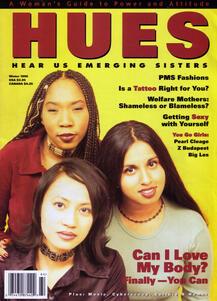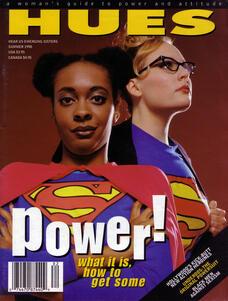Ophira Edut
To me, being Jewish has always been aligned with women’s empowerment and multiculturalism. As the daughter of an Israeli landscaper (dad) and an American rabbi (mom), I grew up believing that cultures could coexist, and women could be whatever we wanted.
As a child of the media, I figured, where better to express this than in a magazine? When I was 19 years old, I teamed up with my twin sister Tali and our friend Dyann Logwood, who is African-American. Together, we founded HUES (Hear Us Emerging Sisters), the first national magazine for young women of all cultures and sizes.
At the time (and to this day), most magazines portrayed a narrow image of women. The pages of every glossy were filled with tall, bony, mostly-white models, punctuated by the same-old article on “Get HIM to Notice You!” or “Flatten Your Tummy by Christmas!” On the other hand, the mags that took women seriously went too far the other way, hitting us as humorless and heavy. We wanted a fun magazine that portrayed women as diverse, smart, soulful, AND sexy – not airbrushed and anorexic – while still telling the truth. So, we created one ourselves.
The HUES mission was to create a space where beauty came in many forms and women got to tell their own stories. The magazine started as a college project in 1992, when I was a University of Michigan sophomore. Young women (and a few good men!) from many backgrounds wrote articles and appeared in photos. We rallied up funding from student organizations, then printed 1,000 copies, which we distributed campus-wide.
It was such a hit that we decided to keep publishing, expanding our reach with each issue. By the time I graduated two years later, HUES had evolved into a full-color, glossy magazine with worldwide distribution to major bookstores and newsstands. Gloria Steinem and Rebecca Walker, two amazing feminist leaders, joined our advisory board. Our readership grew to 20,000 young women and men around the world. We received letters from women in prisons and shelters, readers in Israel, college students, high school girls, and mothers who were so thankful to give their daughters a magazine that was both stylish and smart.
HUES was not overtly feminist, in that we neither required nor banned writers from using the “f-word.” Since some women of color have historically felt excluded by the label, we let each writer define herself: womynist, womanist, feminist, girl-powered, humanist, unlabeled – whatever allowed her most authentic self-expression. I believe that freedom alone made HUES a contribution to feminism.
Eventually, production costs became too high for my post-collegiate wallet, so in 1997, we sold HUES to New Moon Publishing. The Minnesota-based company published New Moon magazine for girls, and kept HUES afloat until 1999.
Although HUES is no longer in print, I’m proud to have brought together such a diverse and inspiring crew to create something previously unseen on the newsstand. We expressed a message with humor, flavor, and strength – that beautiful, intelligent women come in many forms and have much to say. And for a moment in magazine history, we emerged and we were heard.
Ophira Edut is a writer, designer, and entrepreneur who has spent a decade creating groundbreaking media projects focused on teens, women, and multicultural issues. She is the C.O.O. of Mediarology, a content, media consulting, and design company. Ophira and her twin sister Tali are the astrologers for Teen People magazine and the co-authors of Astrostyle: Star-studded Advice for Love, Life & Looking Good (Simon & Schuster, 2003). Ophira is also the editor of Body Outlaws: Young Women Write About Body Image & Identity (Seal Press, 2000), and its "outlawed" first edition, Adios, Barbie. In 1992, Ophira co-founded HUES, a national, multicultural women’s magazine, which was published until 1999. She has since been featured in numerous anthologies and magazines, including Ms., the New York Times, and Entertainment Weekly. Ophira also lectures at colleges and conferences nationwide about body image and the media.





